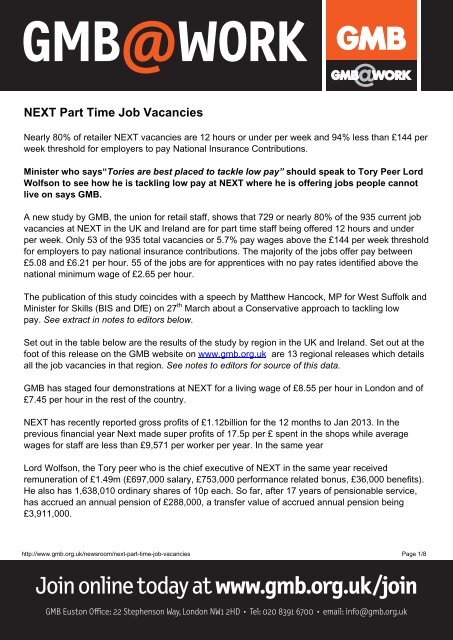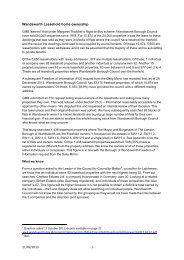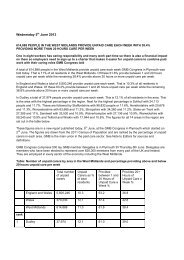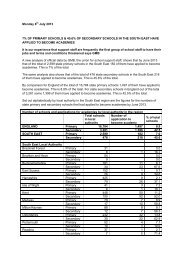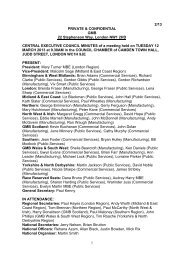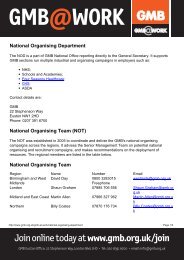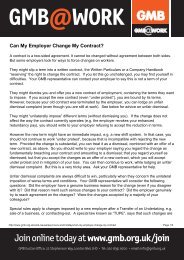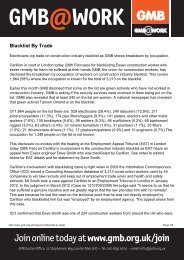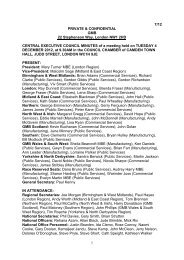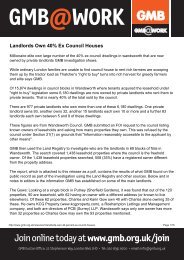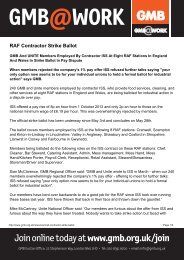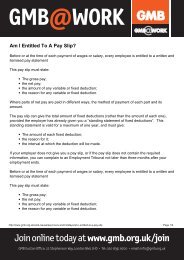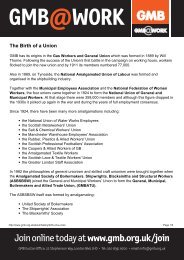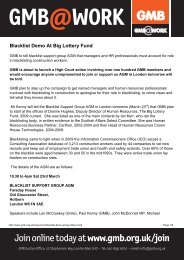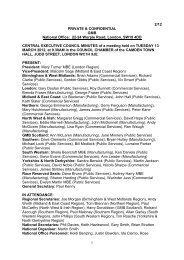NEXT Part Time Job Vacanciesx - GMB
NEXT Part Time Job Vacanciesx - GMB
NEXT Part Time Job Vacanciesx - GMB
You also want an ePaper? Increase the reach of your titles
YUMPU automatically turns print PDFs into web optimized ePapers that Google loves.
<strong>GMB</strong>@WORK<br />
<strong>NEXT</strong> <strong>Part</strong> <strong>Time</strong> <strong>Job</strong> Vacancies<br />
Nearly 80% of retailer <strong>NEXT</strong> vacancies are 12 hours or under per week and 94% less than £144 per<br />
week threshold for employers to pay National Insurance Contributions.<br />
Minister who says“Tories are best placed to tackle low pay” should speak to Tory Peer Lord<br />
Wolfson to see how he is tackling low pay at <strong>NEXT</strong> where he is offering jobs people cannot<br />
live on says <strong>GMB</strong>.<br />
A new study by <strong>GMB</strong>, the union for retail staff, shows that 729 or nearly 80% of the 935 current job<br />
vacancies at <strong>NEXT</strong> in the UK and Ireland are for part time staff being offered 12 hours and under<br />
per week. Only 53 of the 935 total vacancies or 5.7% pay wages above the £144 per week threshold<br />
for employers to pay national insurance contributions. The majority of the jobs offer pay between<br />
£5.08 and £6.21 per hour. 55 of the jobs are for apprentices with no pay rates identified above the<br />
national minimum wage of £2.65 per hour.<br />
The publication of this study coincides with a speech by Matthew Hancock, MP for West Suffolk and<br />
Minister for Skills (BIS and DfE) on 27 th March about a Conservative approach to tackling low<br />
pay. See extract in notes to editors below.<br />
Set out in the table below are the results of the study by region in the UK and Ireland. Set out at the<br />
foot of this release on the <strong>GMB</strong> website on www.gmb.org.uk are 13 regional releases which details<br />
all the job vacancies in that region. See notes to editors for source of this data.<br />
<strong>GMB</strong> has staged four demonstrations at <strong>NEXT</strong> for a living wage of £8.55 per hour in London and of<br />
£7.45 per hour in the rest of the country.<br />
<strong>NEXT</strong> has recently reported gross profits of £1.12billion for the 12 months to Jan 2013. In the<br />
previous financial year Next made super profits of 17.5p per £ spent in the shops while average<br />
wages for staff are less than £9,571 per worker per year. In the same year<br />
Lord Wolfson, the Tory peer who is the chief executive of <strong>NEXT</strong> in the same year received<br />
remuneration of £1.49m (£697,000 salary, £753,000 performance related bonus, £36,000 benefits).<br />
He also has 1,638,010 ordinary shares of 10p each. So far, after 17 years of pensionable service,<br />
has accrued an annual pension of £288,000, a transfer value of accrued annual pension being<br />
£3,911,000.<br />
http://www.gmb.org.uk/newsroom/next-part-time-job-vacancies Page 1/8<br />
Join online today at www.gmb.org.uk/join<br />
<strong>GMB</strong> Euston Office: 22 Stephenson Way, London NW1 2HD • Tel: 020 8391 6700 • email: info@gmb.org.uk
<strong>GMB</strong>@WORK<br />
Next plc vacancies<br />
Number of 12 hours and under over 12 hours various<br />
vacancies<br />
North East 33 27 4 2<br />
North West 126 110 10 6<br />
Yorkshire & The 92 64 24 4<br />
Humber<br />
East Midlands 68 53 15 0<br />
West Midlands 91 62 19 10<br />
Eastern 56 38 17 1<br />
London 56 45 10 1<br />
South East 130 98 22 10<br />
South West 87 73 9 5<br />
Wales 47 41 2 4<br />
Scotland 92 74 12 6<br />
Northern Ireland 31 23 5 3<br />
Republic of Ireland 26 21 3 2<br />
Total 935 729 152 54<br />
Mick Rix, <strong>GMB</strong> National Officer for the retail industry, said “<strong>GMB</strong> undertook this study after<br />
members employed by <strong>NEXT</strong> complained that no new contracts above 12 hours were to be<br />
issued to staff in future in their store.<br />
Members complain that their working hours have been reduced. Some had to accept hours<br />
that are incompatible with their family circumstances, such as single mothers being unable<br />
to drop their children off at school or collect them. Some have had their working hours<br />
reduced from 16 hours, making them ineligible for tax credits.<br />
Matthew Hancock, MP for West Suffolk and Minister for Skills (BIS and DfE) said in a speech<br />
today “Just as in the past I've argued that the centre-right needs to act on unjustified high<br />
pay, on ending the rewards for failure we saw at the top, so we must act on unjustified low<br />
pay at the other end of the spectrum.<br />
Not only are the centre right best placed to tackle low pay, but we need to shout it from the<br />
rooftops. And we would be wrong to be coy about it: Tories are best placed to tackle low<br />
pay”.<br />
http://www.gmb.org.uk/newsroom/next-part-time-job-vacancies Page 2/8<br />
Join online today at www.gmb.org.uk/join<br />
<strong>GMB</strong> Euston Office: 22 Stephenson Way, London NW1 2HD • Tel: 020 8391 6700 • email: info@gmb.org.uk
<strong>GMB</strong>@WORK<br />
Mr Hancock should have word with Tory Peer Lord Wolfson to see how he is tackling low pay<br />
at <strong>NEXT</strong>. He is offering jobs people cannot live on. 94% of the job vacancies at <strong>NEXT</strong> pay<br />
below the £144 per week threshold for employers to pay national insurance contributions.<br />
Mr Hancock will find that that <strong>NEXT</strong> is leading the race to the bottom in the retail industry.<br />
Much of the merchandise they sell in the shops is sourced from badly paid workers in less<br />
developed parts of world. Now they are offering jobs to those selling this merchandise in the<br />
UK and Ireland with so few hours and such low pay that nobody can live on the earnings.<br />
Retailers like <strong>NEXT</strong> and Amazon are anti-union employers. Consumers need to help these<br />
retail workers by insisting that profitable retailers offer a living wage of £8.55 per hour in<br />
London and of £7.45 per hour in the rest of the country and to offer enough hours per week<br />
to enable employees to earn enough to live on.”<br />
End<br />
Contact Paul Maloney 07801 343 839 or Kamaljeet Jandu 07956 237 178 or Mick Rix 07971 268<br />
343 or Michelle Gordon 07866 369 259 or <strong>GMB</strong> press office 07974 251 823 or 07921 289880<br />
Notes to editors:<br />
1 Source of data on <strong>NEXT</strong> vacancies: http://careers.next.co.uk/index.aspx?link=catwalk<br />
2 Extract from speech by Matthew Hancock, MP for West Suffolk and Minister for Skills (BIS and<br />
DfE) is giving this morning 27 th March at the Resolution Foundation, about a Conservative approach<br />
to tackling low pay<br />
“In discussing the economy, it's critical to remember that people, and people's living standards are<br />
the goal, not the means. It's a mistake economists make all the time: believe me; I used to be one.<br />
Just as in the past I've argued that the centre-right needs to act on unjustified high pay, on ending<br />
the rewards for failure we saw at the top, so we must act on unjustified low pay at the other end of<br />
the spectrum.<br />
Not only are the centre right best placed to tackle low pay, but we need to shout it from the rooftops.<br />
And we would be wrong to be coy about it: Tories are best placed to tackle low pay.<br />
http://www.gmb.org.uk/newsroom/next-part-time-job-vacancies Page 3/8<br />
Join online today at www.gmb.org.uk/join<br />
<strong>GMB</strong> Euston Office: 22 Stephenson Way, London NW1 2HD • Tel: 020 8391 6700 • email: info@gmb.org.uk
<strong>GMB</strong>@WORK<br />
TACKLING LOW PAY<br />
In some areas, the Government directly controls pay. By exempting the low paid from the pay<br />
freeze, and by progressive reforms to pensions, the low paid have been protected as much as<br />
possible.<br />
Outside the employment directly controlled by the Government there are three crucial drivers of pay:<br />
the minimum wage, tax, and productivity. We must use all three.<br />
First, the clearest rule governing low pay is the minimum wage. Some argue that the minimum wage<br />
is bad for the economy because it damages our competitiveness. We have relatively high pay<br />
compared to the rest of the world, and to compete we must keep our costs low. Now I'm<br />
passionately in favour of making Britain more competitive.<br />
But we want to be competitive so people can be better paid. What is competitiveness for, if it's not to<br />
make us more prosperous and free? The standard argument against the minimum wage is that a<br />
minimum wage would price people out of jobs.<br />
But work is a team effort. Working out how work is down to which member of the team is an<br />
imprecise art. Just as with high pay, the question of just rewards is important.<br />
Crucially, job creation in Britain is happening at a pace.<br />
In some areas there are skills shortages, alongside youth unemployment. Unless work pays, we will<br />
not get people out of benefits and into work.<br />
The minimum wage is crucial to doing that. It supports the supply side. Indeed welfare reform, to<br />
make work pay, is strengthened by a higher minimum wage.<br />
The bigger the pay rise when you go off benefits and into work, the more people we will get off<br />
benefits and into work. So I think we should not only support the minimum wage, but strengthen it.<br />
Because a strong minimum wage supports jobs by making work pay.”<br />
Nearly 80% of retailer <strong>NEXT</strong> vacancies are 12 hours or under per week and 94% less than £144 per<br />
week threshold for employers to pay National Insurance Contributions.<br />
http://www.gmb.org.uk/newsroom/next-part-time-job-vacancies Page 4/8<br />
Join online today at www.gmb.org.uk/join<br />
<strong>GMB</strong> Euston Office: 22 Stephenson Way, London NW1 2HD • Tel: 020 8391 6700 • email: info@gmb.org.uk
<strong>GMB</strong>@WORK<br />
Minister who says“Tories are best placed to tackle low pay” should speak to Tory Peer Lord<br />
Wolfson to see how he is tackling low pay at <strong>NEXT</strong> where he is offering jobs people cannot<br />
live on says <strong>GMB</strong>.<br />
A new study by <strong>GMB</strong>, the union for retail staff, shows that 729 or nearly 80% of the 935 current job<br />
vacancies at <strong>NEXT</strong> in the UK and Ireland are for part time staff being offered 12 hours and under<br />
per week. Only 53 of the 935 total vacancies or 5.7% pay wages above the £144 per week threshold<br />
for employers to pay national insurance contributions. The majority of the jobs offer pay between<br />
£5.08 and £6.21 per hour. 55 of the jobs are for apprentices with no pay rates identified above the<br />
national minimum wage of £2.65 per hour.<br />
The publication of this study coincides with a speech by Matthew Hancock, MP for West Suffolk and<br />
Minister for Skills (BIS and DfE) on 27 th March about a Conservative approach to tackling low<br />
pay. See extract in notes to editors below.<br />
Set out in the table below are the results of the study by region in the UK and Ireland. Set out at the<br />
foot of this release on the <strong>GMB</strong> website on www.gmb.org.uk are 13 regional releases which details<br />
all the job vacancies in that region. See notes to editors for source of this data.<br />
<strong>GMB</strong> has staged four demonstrations at <strong>NEXT</strong> for a living wage of £8.55 per hour in London and of<br />
£7.45 per hour in the rest of the country.<br />
<strong>NEXT</strong> has recently reported gross profits of £1.12billion for the 12 months to Jan 2013. In the<br />
previous financial year Next made super profits of 17.5p per £ spent in the shops while average<br />
wages for staff are less than £9,571 per worker per year. In the same year<br />
Lord Wolfson, the Tory peer who is the chief executive of <strong>NEXT</strong> in the same year received<br />
remuneration of £1.49m (£697,000 salary, £753,000 performance related bonus, £36,000 benefits).<br />
He also has 1,638,010 ordinary shares of 10p each. So far, after 17 years of pensionable service,<br />
has accrued an annual pension of £288,000, a transfer value of accrued annual pension being<br />
£3,911,000.<br />
Next plc vacancies<br />
Number of 12 hours and under over 12 hours various<br />
vacancies<br />
North East 33 27 4 2<br />
North West 126 110 10 6<br />
http://www.gmb.org.uk/newsroom/next-part-time-job-vacancies Page 5/8<br />
Join online today at www.gmb.org.uk/join<br />
<strong>GMB</strong> Euston Office: 22 Stephenson Way, London NW1 2HD • Tel: 020 8391 6700 • email: info@gmb.org.uk
<strong>GMB</strong>@WORK<br />
Yorkshire & The<br />
Humber<br />
92<br />
64<br />
24<br />
4<br />
East Midlands 68 53 15 0<br />
West Midlands 91 62 19 10<br />
Eastern 56 38 17 1<br />
London 56 45 10 1<br />
South East 130 98 22 10<br />
South West 87 73 9 5<br />
Wales 47 41 2 4<br />
Scotland 92 74 12 6<br />
Northern Ireland 31 23 5 3<br />
Republic of Ireland 26 21 3 2<br />
Total 935 729 152 54<br />
Mick Rix, <strong>GMB</strong> National Officer for the retail industry, said “<strong>GMB</strong> undertook this study after<br />
members employed by <strong>NEXT</strong> complained that no new contracts above 12 hours were to be<br />
issued to staff in future in their store.<br />
Members complain that their working hours have been reduced. Some had to accept hours<br />
that are incompatible with their family circumstances, such as single mothers being unable<br />
to drop their children off at school or collect them. Some have had their working hours<br />
reduced from 16 hours, making them ineligible for tax credits.<br />
Matthew Hancock, MP for West Suffolk and Minister for Skills (BIS and DfE) said in a speech<br />
today “Just as in the past I've argued that the centre-right needs to act on unjustified high<br />
pay, on ending the rewards for failure we saw at the top, so we must act on unjustified low<br />
pay at the other end of the spectrum.<br />
Not only are the centre right best placed to tackle low pay, but we need to shout it from the<br />
rooftops. And we would be wrong to be coy about it: Tories are best placed to tackle low<br />
pay”.<br />
Mr Hancock should have word with Tory Peer Lord Wolfson to see how he is tackling low pay<br />
at <strong>NEXT</strong>. He is offering jobs people cannot live on. 94% of the job vacancies at <strong>NEXT</strong> pay<br />
below the £144 per week threshold for employers to pay national insurance contributions.<br />
http://www.gmb.org.uk/newsroom/next-part-time-job-vacancies Page 6/8<br />
Join online today at www.gmb.org.uk/join<br />
<strong>GMB</strong> Euston Office: 22 Stephenson Way, London NW1 2HD • Tel: 020 8391 6700 • email: info@gmb.org.uk
<strong>GMB</strong>@WORK<br />
Mr Hancock will find that that <strong>NEXT</strong> is leading the race to the bottom in the retail industry.<br />
Much of the merchandise they sell in the shops is sourced from badly paid workers in less<br />
developed parts of world. Now they are offering jobs to those selling this merchandise in the<br />
UK and Ireland with so few hours and such low pay that nobody can live on the earnings.<br />
Retailers like <strong>NEXT</strong> and Amazon are anti-union employers. Consumers need to help these<br />
retail workers by insisting that profitable retailers offer a living wage of £8.55 per hour in<br />
London and of £7.45 per hour in the rest of the country and to offer enough hours per week<br />
to enable employees to earn enough to live on.”<br />
End<br />
Contact Paul Maloney 07801 343 839 or Kamaljeet Jandu 07956 237 178 or Mick Rix 07971 268<br />
343 or Michelle Gordon 07866 369 259 or <strong>GMB</strong> press office 07974 251 823 or 07921 289880<br />
Notes to editors:<br />
1 Source of data on <strong>NEXT</strong> vacancies: http://careers.next.co.uk/index.aspx?link=catwalk<br />
2 Extract from speech by Matthew Hancock, MP for West Suffolk and Minister for Skills (BIS and<br />
DfE) is giving this morning 27 th March at the Resolution Foundation, about a Conservative approach<br />
to tackling low pay<br />
“In discussing the economy, it's critical to remember that people, and people's living standards are<br />
the goal, not the means. It's a mistake economists make all the time: believe me; I used to be one.<br />
Just as in the past I've argued that the centre-right needs to act on unjustified high pay, on ending<br />
the rewards for failure we saw at the top, so we must act on unjustified low pay at the other end of<br />
the spectrum.<br />
Not only are the centre right best placed to tackle low pay, but we need to shout it from the rooftops.<br />
And we would be wrong to be coy about it: Tories are best placed to tackle low pay.<br />
TACKLING LOW PAY<br />
In some areas, the Government directly controls pay. By exempting the low paid from the pay<br />
freeze, and by progressive reforms to pensions, the low paid have been protected as much as<br />
http://www.gmb.org.uk/newsroom/next-part-time-job-vacancies Page 7/8<br />
Join online today at www.gmb.org.uk/join<br />
<strong>GMB</strong> Euston Office: 22 Stephenson Way, London NW1 2HD • Tel: 020 8391 6700 • email: info@gmb.org.uk
Powered by TCPDF (www.tcpdf.org)<br />
<strong>GMB</strong>@WORK<br />
possible.<br />
Outside the employment directly controlled by the Government there are three crucial drivers of pay:<br />
the minimum wage, tax, and productivity. We must use all three.<br />
First, the clearest rule governing low pay is the minimum wage. Some argue that the minimum wage<br />
is bad for the economy because it damages our competitiveness. We have relatively high pay<br />
compared to the rest of the world, and to compete we must keep our costs low. Now I'm<br />
passionately in favour of making Britain more competitive.<br />
But we want to be competitive so people can be better paid. What is competitiveness for, if it's not to<br />
make us more prosperous and free? The standard argument against the minimum wage is that a<br />
minimum wage would price people out of jobs.<br />
But work is a team effort. Working out how work is down to which member of the team is an<br />
imprecise art. Just as with high pay, the question of just rewards is important.<br />
Crucially, job creation in Britain is happening at a pace.<br />
In some areas there are skills shortages, alongside youth unemployment. Unless work pays, we will<br />
not get people out of benefits and into work.<br />
The minimum wage is crucial to doing that. It supports the supply side. Indeed welfare reform, to<br />
make work pay, is strengthened by a higher minimum wage.<br />
The bigger the pay rise when you go off benefits and into work, the more people we will get off<br />
benefits and into work. So I think we should not only support the minimum wage, but strengthen it.<br />
Because a strong minimum wage supports jobs by making work pay.”<br />
http://www.gmb.org.uk/newsroom/next-part-time-job-vacancies Page 8/8<br />
Join online today at www.gmb.org.uk/join<br />
<strong>GMB</strong> Euston Office: 22 Stephenson Way, London NW1 2HD • Tel: 020 8391 6700 • email: info@gmb.org.uk


